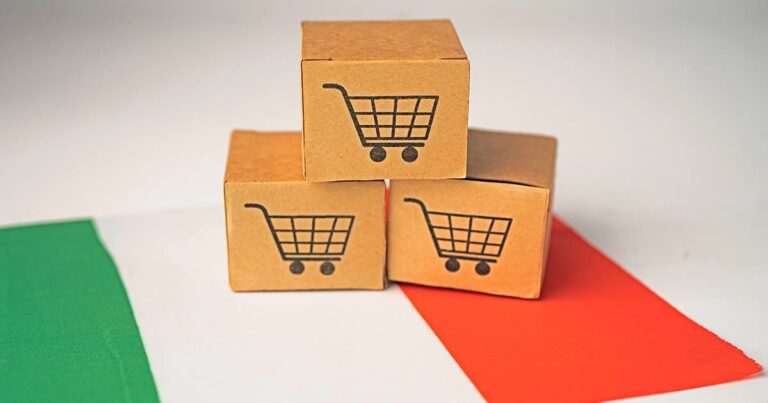Moving Overseas For Work? Use These Checklists Before You Make The Move!

This article covers:
Found a job overseas? Congratulations! Moving to another country for work can be one of life’s most rewarding experiences, be it financially, personally or culturally. But realistically speaking, it can also be daunting and can get even the toughest of people to panic.
What to do, what to buy, what to take and what to leave behind – these are only some of the decisions every would-be expat has to make before the big move.
But hold on! There’s no need to hit the panic button just yet; we have compiled two pretty comprehensive lists for all you expats-to-be. Here’s what you are going to find in these lists.
LIST 1 catalogues the most critical/essential items you should pack while moving. It aims to answer all your packing-related questions in a systematic format. We call this the To-Pack-List.
Anyone who has ever relocated to a new country will tell you that packing ‘stuff’ is only one of its important aspects. If you’re relocating, you will need to complete several important tasks as well. Stressed and confused? Don’t be, help is right here! Our LIST 2 deals with a more generic inventory of to-dos. However, these lists are generic that can be used as a checklist, and you can personalise it based on your needs, lifestyle and future plans.
The Ultimate ‘To-Pack-List’
1. Critical Documents
It goes without saying that the first item on your must-pack list must be your critical documents. These should include your:
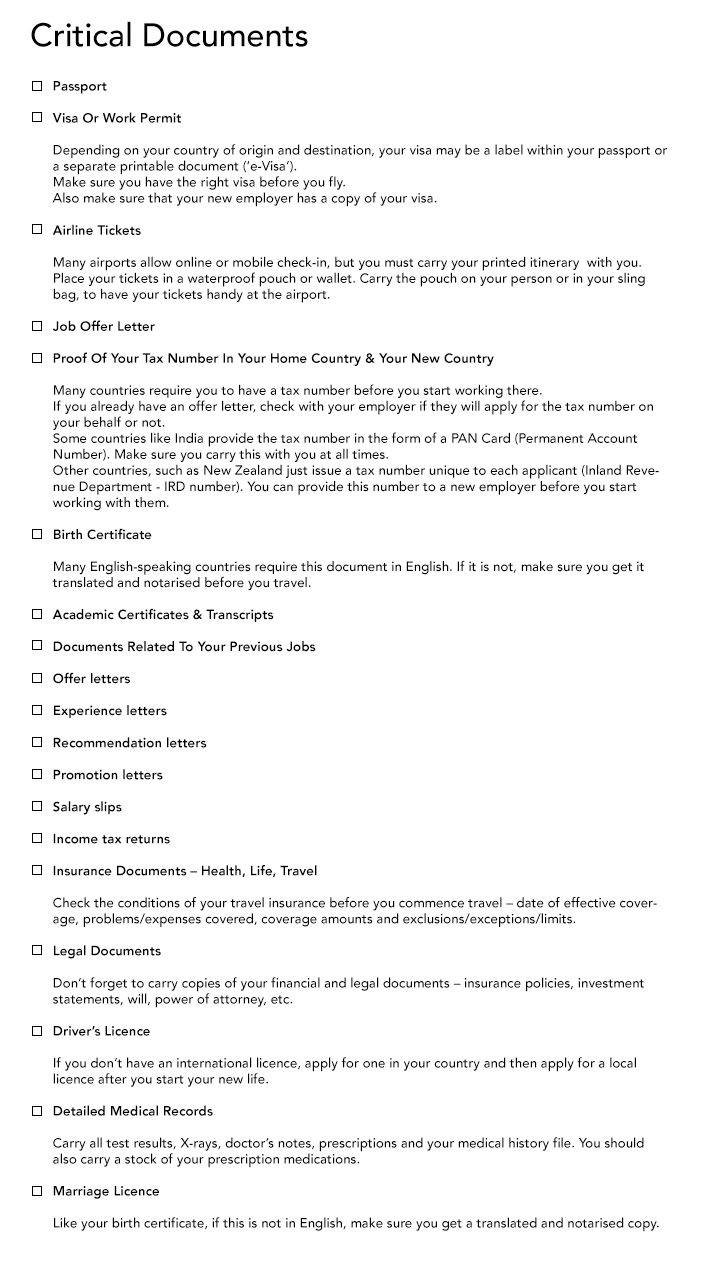
Use this free printable checklist to make your travel hassle-free
It makes good sense to carry at least two copies of all critical documents.
Make sure that the originals and copies are not in the same bag. This way, if one bag is misplaced or lost (which is very common during air travel), you will at least have one set of documents with you.
Important Tip:
Scan all your documents and upload them to a cloud storage service such as Google Cloud or Dropbox. Many of these services are free for personal use, and allow you to store massive quantities of data for years.
If your spouse and/or children are moving with you, remember to add all the above documents for them as well.
2. Medicines
In addition to your medical history file and other documents, you should also carry a stock of your prescription medications before moving abroad.
Be aware that your current stock will run out eventually so you must find a way to keep your prescriptions going in your new country. If the exact same medications are not available, see a doctor or pharmacist there, and ask them about generic substitutes that will work just as well. Make sure your current doctor writes up fresh prescriptions on her official letterhead along with her contact details that you can show to the doctor or pharmacist in your new country.
You should also carry some over-the-counter (OTC) medications with you. You will probably find these quite easily in your new country, but it is still prudent to carry your own stock while you take time to understand the medical system there. These include:
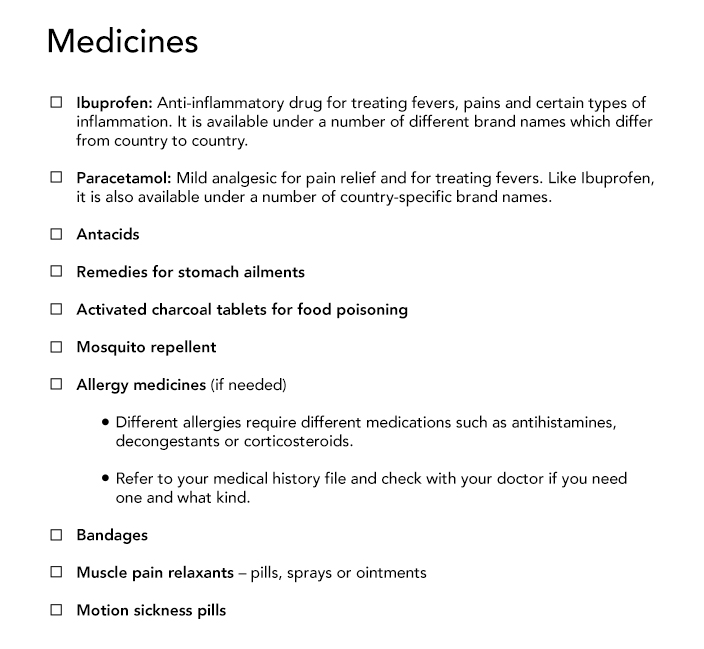
Use this free printable travel checklist so that you don’t forget to pack these essential items
3. Cash & Cash Substitutes
- Before you fly, check if you can open a new bank account in your destination country. Your employer may do this for you; make sure you get the details (account number, passwords, PIN numbers, etc) beforehand.
- And before you fly, transfer some money to this account to keep you going for a few weeks in your new country, at least before your first paycheque!
- Also, check if the bank can send you an international debit/ATM card that you can use for expenses en-route. If this is not possible, carry enough cash to tide you over for at least two weeks in your new country.
- Don’t forget to also carry some foreign exchange for the countries you will be travelling through. If you are like most jetlagged passengers, you might need to buy a coffee at a strange airport at 3 in the morning!
4. Important Information
Always store important contact details such as addresses and phone numbers either programmed into your phone (also see Item #7) or written down in a diary or notebook. Keep the diary in your carry-on bag. Placing it in your checked-in bag only to have the bag lost or misplaced defeats the entire purpose of this.
i. The emergency number of your new country
- USA and Canada – 911
- UK – 999
- Australia – 000 from landline phones, 112 from mobile phones
- New Zealand – 111
- European Union – 112
ii. The address and phone number of your home country’s embassy or high commission in your new country. The embassy can help you with issues such as accidents, loss of passports or police verification certificates.
iii. The address and phone number of your new workplace. Make sure that your family and friends have the address and phone number of your new workplace as well.
5. Clothing & Accessories
Selecting and packing the right clothing and accessories can be a very stressful activity prior to relocation. Before your journey, check the weather and the seasonal patterns in your new country and pack accordingly. Knowing how long you will stay will also aid your decision. Then, depending on where you’re moving, when and for how long, you should include some or all of the below items in your luggage.
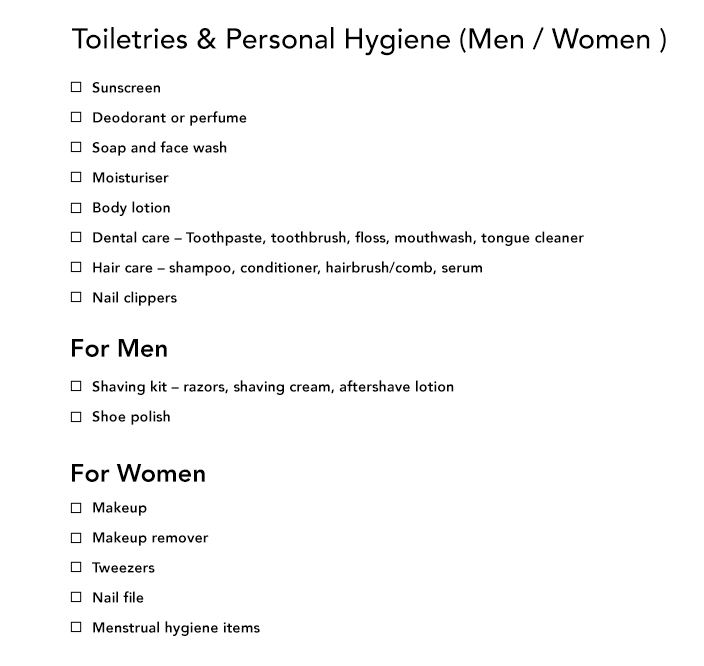
Use this free printable travel checklist so that you don’t forget to pack the stuff you need
If you prefer to travel light, pack only the essentials and buy the rest in your new country. Be aware though that clothing in some countries can be very expensive (for example New Zealand and many European countries), so you may be better off shopping before you fly.
6. Toiletries & Personal Hygiene
Toiletry items are easily available in most countries. But some items may be harder to find in your new country, or they may be more expensive. It makes sense to stock up on these items before you fly, at least to tide you over for a few weeks. If you have sensitive skin, do some research on brands before buying any of these items in your new country.

Use this free printable travel checklist so that you don’t forget to pack these essentials
7. Electronics
In this era of connectivity, electronic items play a crucial role when you are relocating. Before you finalise your list, make sure you gather some information on the electrical system of your new home country. Voltage and current requirements differ from one country to another, so you can end up damaging your electronic items such as laptops and chargers if they are not compatible with your new country’s system.
i. Mobile Phone & Charger Plus Portable Charger
- Make sure that you don’t have a ‘locked’ phone. A locked phone cannot be used in any country other than its country of origin. If it cannot be unlocked in your new country, you will have to buy a new phone.
- Buy a prepaid or postpaid plan from a mobile service provider in your destination country.
- In some cases, it makes more sense to buy a new phone and phone plan after landing in your new country.
ii. Travel Adapter With Universal Socket
- With a universal socket travel adapter, you won’t have to buy a different adapter for using your devices in different countries.
iii. Laptop and charger
iv. Wireless mouse and/or keyboard
v. External hard drive to back files up
vi. Pen drives
vii. Headphones or earphones
viii. MP3 player (if your phone doesn’t have one)
ix. Camera (if your phone doesn’t have one)
x. Tablet computer (optional)
xi. E-book reader (optional)
8. Miscellaneous Items
Here are some other odds-and-ends that will make your move abroad easier:
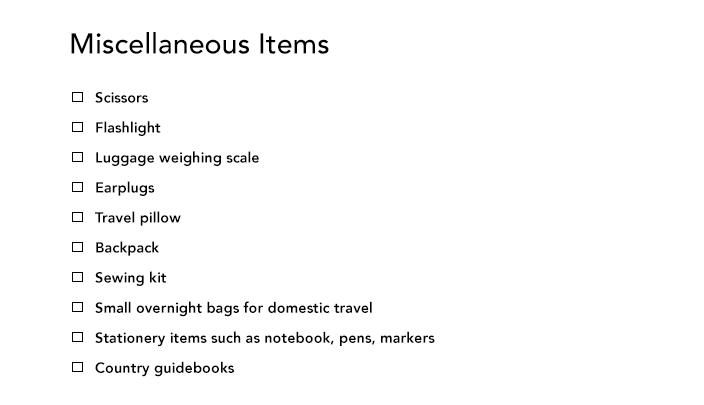
Use this free printable travel checklist so that you don’t forget to pack anything
Make smart packing choices by figuring out what you absolutely need, how much you can carry (check airline regulations on luggage allowance) and what you can buy in your new country. Another option is to travel light, carry only the essentials, and ship the rest through a courier company. Shipping is generally cheaper than paying airline rates but costs can add up, depending on weight and destination country.
The Ultimate To-Do-List
Apart from all the packing, you also need to take care of a zillion other things. We have listed down some important aspects that you really need to think through before making the shift. This list is divided into 7 sections. Feel free to go through them out of order.
1. Packing Inventory
Create an inventory of all the things you need to take, buy or leave behind.
2. Know Your Living Situation – Current & Future
- What is your current living situation? Do you own a home or are you renting?
- If you are a homeowner, will you be renting it out while you’re away? If not, do you need to hire a caretaker or house-sitter to keep an eye on things?
- Talk to the utility (water, electricity) service providers if you plan to continue the services. Pay dues, and make arrangements to pay future bills to avoid disconnection. Setting up automatic billers in your online bank account will regularise this process and make it hassle-free.
- If you are currently renting, how long is your lease? When do you need to inform your landlord that you are leaving? Make sure you document all such communication to prevent future problems.
- Do you know yet where you will be living in your new country? Talk to your new employer and ask if they can arrange temporary housing until you can find something more permanent.
- Scan all property/house rental websites in your new country. If you find any houses/flats that interest you, contact the listing agent for further information such as moving in date, advance payments, rent, rent period (weekly/monthly), utilities included, etc.
- Remember that living requirements are different for those who move alone versus those who move with the family. Customise your home search accordingly.
3. Manage Your Personal Property
Your home is only one part of your personal property. Others include your car (or other vehicles), your furniture, your appliances, your phones, etc.
- Will you be shipping any of these items to your new destination? If yes, find a reliable courier company and get a quote from them. Remember that shipping charges usually depend on weight, item type, source country and destination country. Talk to the company about insurance for your goods.
- Before you ship anything, check your destination country’s biosecurity procedures and ‘banned goods’ list. This list of items that cannot be brought into New Zealand is a good example.
- If your plan is to leave your things behind, decide what you will do with them – leave them in your home, donate them or sell them? In today’s technology-obsessed world, it is now easier than ever to buy and sell used goods. Find a reliable website that can help you do this.
- Figure out what you will do with your mobile phone. If it is ‘locked’ for use in one single country, you may not be able to use it in your new country. In that case, you can either donate it or sell it. If you have a landline telephone, make arrangements with the phone company to get it disconnected. Make sure you pay all dues!
4. Travel Paperwork
- Check that all your travel paperwork is in order. This will include your passport, visa, work permit, tickets, travel insurance, etc.
- Make a note of dates, conditions of travel and exceptions if any.
- Very important – if you haven’t done so already, check that your passport is up-to-date.
- Make photocopies of these documents and place them in your carry-on luggage. Also, upload scanned copies to the Cloud.
5. Medical Checkups
- Schedule medical tests as required, and arrange to send the results to your new employer (if they ask).
- Your visa processing officer may also need a copy of the medical report.
- Some countries have strict requirements regarding immunisation and quarantines. If you are travelling through or to such a country, check if you need to get yourself immunised against certain diseases like malaria, or particular viruses like Zika.
- Talk to your doctor about your current medications, and get new prescriptions if required. Obtain copies of older medical reports if you don’t have them already.
6. Manage Your Relationships
So many people forget this important step in the chaos of moving.
- Spend time with friends and family and say goodbye in person if possible.
- Remember to return everything you have borrowed from them, and get your stuff back too!
- Give them your new contact details. Use social media to stay in touch.
- Find networking opportunities with people in your new country. Networking can be both social and professional, and it can really help you settle in and deal with homesickness effectively. It can also help you build long-term relationships. Sign up with sites like meetup, Internations and LinkedIn. Remember to keep your profile(s) up-to-date!
7. Other Tasks
Don’t leave these tasks for later. Complete them before you move to the new place.
- Cancel newspaper and magazine subscriptions.
- Cancel library and club memberships.
- If you are a parent, research schools, extracurricular activities and daycare centres for your children.
- Get information on medical centres, hospitals and pharmacists in your new city. Research the healthcare system there – insurance, costs, paperwork, etc.
- Get some information about your new country and city. The Internet offers a wealth of information, but guidebooks like Lonely Planet can be especially useful.
- If you have any insurance policies, confirm with the provider if they will remain in effect even after you leave the country. If not, cancel them. Collect refunds, if any.
- Talk to your banking relationship advisor about your bank accounts. Many large banks offer non-resident accounts with special advantages. Check if you need to open a new account, transfer your existing account, or close it entirely.
- Settle all outstanding bills – grocer, milkman, newspaper agent, etc.
- Pay pending taxes.
- Buy some foreign exchange (cash) for the new country and for countries you will be passing through.
- Research insurance and investment options in your new country.
We hope these two lists give you a good starting point to prepare for your big move.
The key is to start preparing early and to prioritise.
Draw up your to-do list at least two months prior to your scheduled departure date. Add or remove items to the list as per your requirements.
Use technology to make the move easier and hassle-free. This page provides good information on some useful list-making applications. If you can’t be bothered with apps, good old Microsoft Excel works just as well!
The Bottomline
Don’t let the nitty-gritties of the move overwhelm you. Have fun with the process and enjoy your new life overseas!
 Get the app
Get the app






